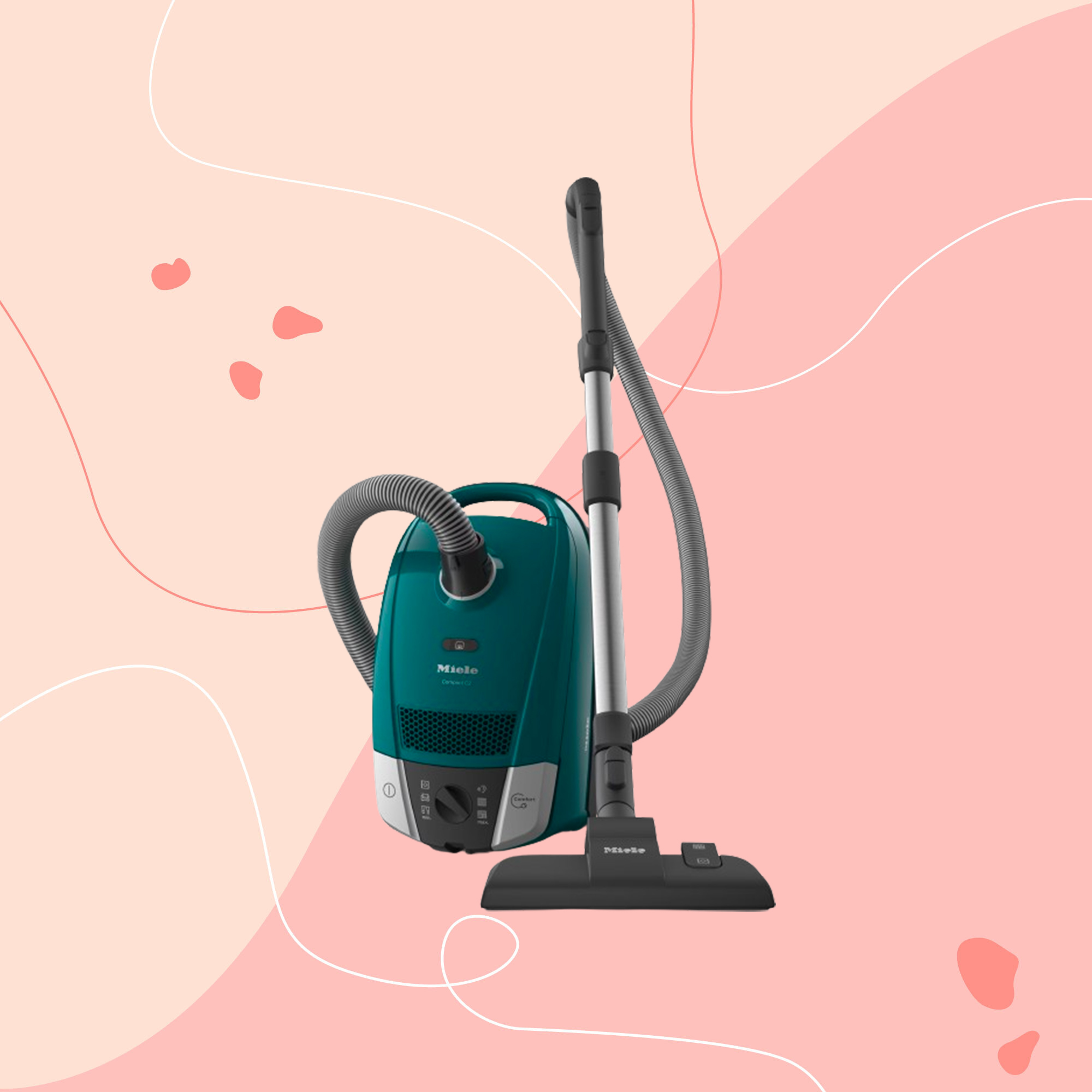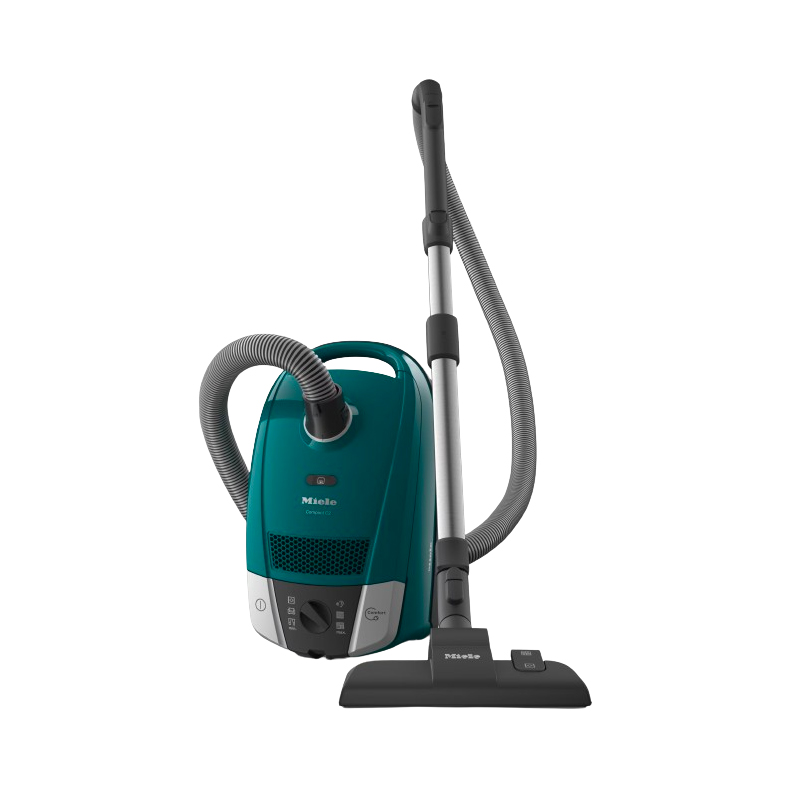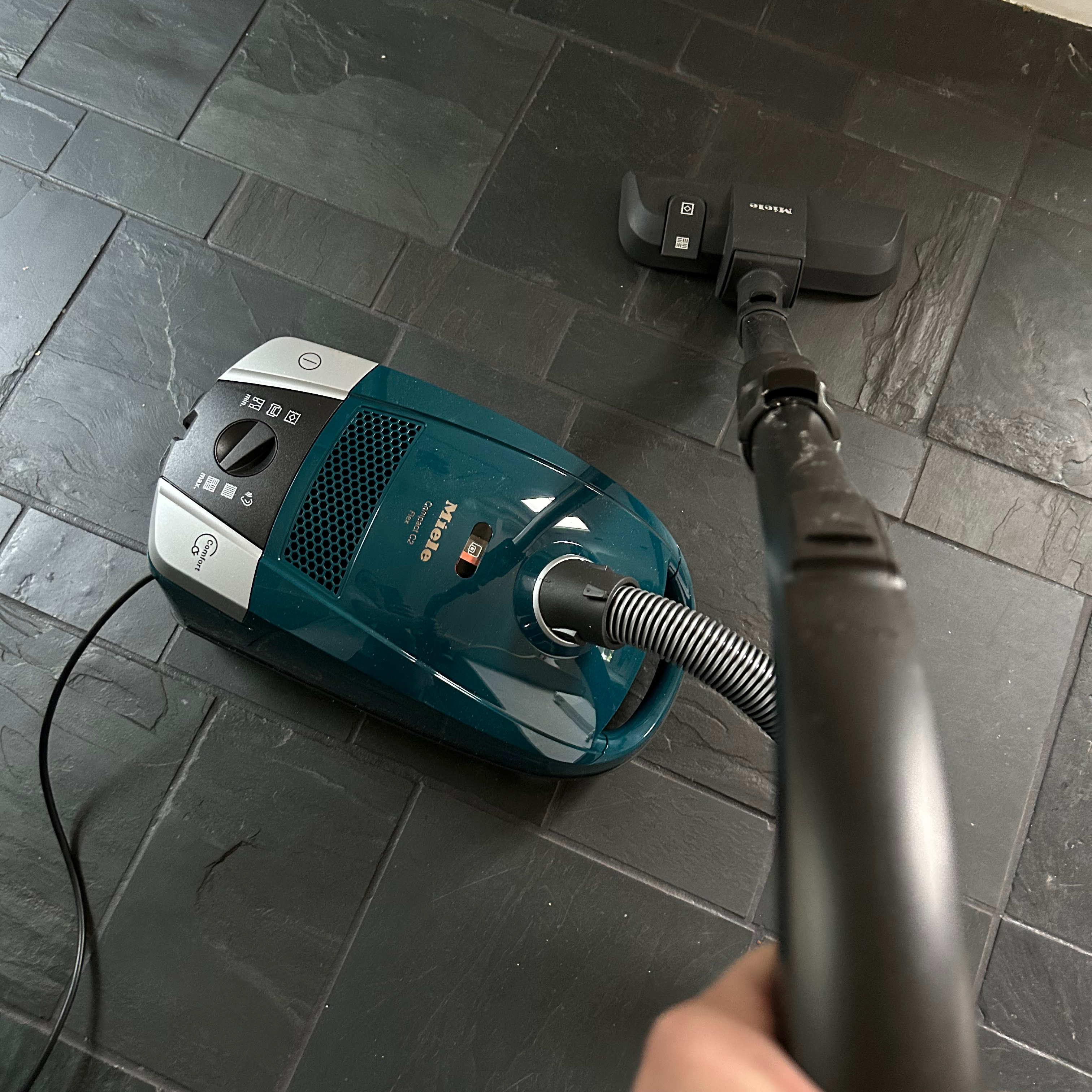
If vacuuming is one of life’s dullest chores, then choosing a new vacuum - on which to spend your hard earned cash - is also somewhat yawn inducing. But, it’s time to flip your thinking, because if you invest in a great vacuum cleaner, like the Miele Compact C2 Flex, you’ll make this household chore easier and faster, which is ultimately preferable to slogging away with an inefficient model.
Miele is a German brand with an impeccable reputation across all home appliances, and Miele vacuums are no exception, making it onto the list of the best vacuum cleaners already with the pet-friendly C3 model. The Miele Compact C2 Flex isn’t the cheapest bagged cylinder made by the brand, nor is it the most expensive, but it is probably the most compact.
I must admit that I’ve owned a Miele bagged cylinder vacuum that I’ve managed to keep going for about 15 years. It’s survived through house renovations, extensions, not to mention everyday life. So my experience gives me faith that these vacuums are well made and can go the distance. That said, vacuum technology has changed drastically in that time, so I was interested to see how the Compact C2 Flex would perform.
Miele Compact C2 Flex Product Specs

- Type: Cylinder, bagged, corded
- Dustbag volume: 3.5 litres
- Weight: 6.5kg including accessories
- Dimensions: 23 x 42.5 x 23cm
- Power: 890W
- Cable length: 7.5 metres
- Accessories: upholstery nozzle, crevice nozzle, dusting brush, extra long flexible crevice nozzle
- Power levels: 6
- RRP: £259
Unboxing, setting up and first impressions
In the box, the vacuum itself is protected on both ends by chunks of polystyrene. But thankfully the accessories are wrapped in a much more environmentally friendly cardboard box. Once I’d unpacked everything it didn’t take much to figure out how to click the hose onto the vacuum, and then, in what order the other parts clicked into place.
True to its name, it is compact for a cylinder vacuum. It’ll easily slot into a cupboard. But at the same time it still comes loaded with all the main tools and accessories you’d expect. Although notably, the floorhead isn’t the type with a rotating brush, meaning it’s unlikely to suit households with pets.

Unlike some Miele vacuums, this one doesn’t include storage inside the vacuum for the three small cleaning tools. But instead there’s a cradle that holds all three, and it slots onto the handle. On first impressions, it looks like it’s in an awkward location and I’m worried that it’ll get in the way and annoy me whilst I’m vacuuming.
The only accessory that has to be stored separately is the long, thin crevice nozzle. But this clever bendy attachment will certainly come in handy for vacuuming those really hard-to-reach spots like down the side of the fridge or washing machine.

The vacuum comes with one dust bag already in place. But you’ll need to get a box of spares ready for when this one fills up. On the Miele website a box of eight bags currently costs £21 and this includes motor protection filters and exhaust filters.
Between the handle and the floorhead there’s a telescopic tube, so adjusting the working height of the vacuum is quick and easy. The floorhead has a foot pedal to adjust the brush height depending on whether you’re vacuuming carpet or hard floor. Likewise the on/off switch as well as the cord rewind switch on the vacuum are both large and and easily operated with your foot, reducing the need to constantly bend down to the controls.

You do have to adjust the power dial by hand though. There are six options to choose from, including curtains and fabric, upholstery, cut pile carpets and rugs, energy saving and quiet, loop pile carpets and rugs, and finally the maximum suction, which is described as suitable for hard floor and heavily soiled carpets and rugs.
At first I couldn’t tell whether you select the power level by pointing the thin part or the fat part of the dial at the symbol. But it becomes a bit more obvious when the vacuum is switched on and you hear the power increasing as the thin part is moved closer to the max suction level.
What is it like to use?
Hard floor
Hard floors, in general, aren’t too tricky for most vacuums. And it vacuumed all my hard floors with ease. As I pulled on the hose, it smoothly followed me around rooms and rather than finding the position of the tools annoying, it was helpful to have them close to hand.
I deliberately spilled a mix of flour, crumbs, and suet on my kitchen floor to see how well it retrieved the mixture from the very edge of a cupboard. I have to say, I was impressed. I did the test a few times, to check both the right and the left side of the floorhead, as well as what happened if I vacuumed towards the cupboard with the front of the floorhead.

In every instance it greedily sucked up all the debris from the corner in one pass. This is particularly good since my kitchen floor is an uneven slate tile with big grout lines that frequently cause issues for other vacuums.
I spilled the same mixture on my wood floor and had the inevitable dread as I watched it settle deep into the cracks between the boards. But, thankfully the Miele just sucked it straight up without hesitation.
Carpet
Tapping the foot switch on the floorhead changes the brushes from hard floor to carpet mode. But the first time I used this vacuum on my short pile carpets, I had to reduce the suction from max, down to the quiet/ eco setting. The suction on max was too strong and I could barely push it across the carpet.
But once I’d made the adjustment it collected all the visible debris and left the carpet looking clean and fresh. However, as I’ve already said, if you’re trying to remove pet hairs from carpet, you’ll need a vacuum with a turbo brush style floorhead, which this is not.

On a long pile area rug I tried the ‘rug’ power setting, and the vacuum was easy to push, but it wasn’t cleaning it effectively enough on this lower setting. So I increased the power to the quiet/ eco setting which made it tougher to push, but the embedded debris was removed more effectively. Afterwards, the pile of the rug was lifted and refreshed, so I didn’t mind the five minute arm workout.

Carpeted stairs were no problem, the vacuum is small enough to balance on a stair and I made use of the telescopic tube to shorten the distance between the floorhead and handle which helps when vacuuming in a confined space. Furthermore, having the smaller tools right next to the handle made it quick and easy to switch to them when I needed to get into awkward corners.
Using the tools
One of the first things I did with this vacuum was to vacuum out my whole car. This is a great way to test out all of the small hand tools as well as the different power levels, as well as to work out which vacuum tool is right for each job. The small tools, all worked as expected. I found the small brush was quite good at dislodging debris from the carpet, and I switched between this and the upholstery tool.
The crevice tool was long enough for some of the nooks and crannies, but when it wasn’t, I turned to the big crevice tool. This significantly longer version is also bendy, so it could effectively reach deep down in the crevices at the sides of the seats. My car was left cleaner than it’s been in months!

Back in the house, the upholstery tool and upholstery power setting combined was just the ticket for sprucing up my sofas and cushions. Meanwhile, my avid hatred of dusting led me to using the dusting brush to remove dust and cobwebs from several surfaces around the house. I loved having all the tools attached to handle so I could switch between them as I worked my way around a room.
I don’t think this is a noisy vacuum, on the highest suction level I measured the sound at around 80dB on hard floors and 73dB on carpet. Meanwhile, the lowest suction level hit 68 dB on hard floors, and 65dB on carpet.
How does it compare to similiar vacuums?
If you have pets, this model won’t fit the bill. But take a look at the Miele Complete C3 Cat & Dog instead. Its RRP of £389 will require you to increase your budget, but it’s hard to put a price on the ability to remove all that fusty pet hair from your home. The downside is that it’s not so compact.
If easy storage is top of your priority list you might want to consider a cordless stick vacuum like the Shark Stratos IZ420UKT. As is the case for most cordless vacuums, it’s not cheap at almost £500. But its slim stature will slot neatly into narrow storage spaces. And, importantly, it’s a great performer that’ll give you a reliable clean. If you want snazzier features, then you might want to read up on how this brand shapes up against one of the fancier brands out there in our Dyson vs Miele head-to-head feature.
Cleaning and maintenance
Because this vacuum takes dust bags, there are no dust clouds polluting your home every time you empty it, which makes emptying far more pleasant. Furthermore, it doesn’t need emptying frequently. And the handy indicator on top lets you know when the bag is getting full.

The motor protection filter and the exhaust filter are easily accessible, when you open the top of the vacuum. And changing them is a breeze, the exhaust filter only needs changing yearly. The motor protection filter should be changed every time you change the bag, and since these filters come with the bags, it’s easy to remember to do this.
Should you buy the Miele Compact C2 Flex?
I’ve made no secret of the fact that I’m a fan of a bagged vacuum and I also believe the positives of a corded vacuum can, in many circumstances, outweigh the negatives. Add to this, the fact that it did a great job cleaning my home, means that in my opinion this is a cleaning appliance that is absolutely worth your money.
It’s not tiny, but it’s nicely compact and I believe it’s good value for money. Like I’ve said, it’s not for pet owners. But it can cope with multiple floor types and provide a reliable clean. I was particularly impressed with its suction power along edges like kickboards and skirting boards - something not all vacuums are good at.







